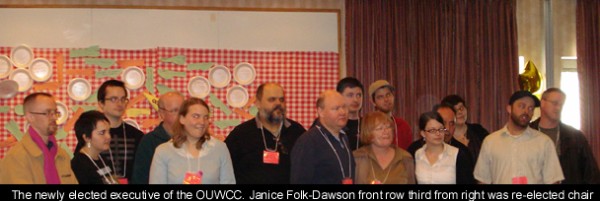Please Click Here to find recent news, events and information from CUPE Ontario.
Coordinating Our Future, the Ontario University Workers Coordinating Committee (OUWCC) annual conference, was an innovative and extremely successful event. Held in kitchener, over 100 delegates from campuses across the province attended.
The majority of our delegates are new to CUPE, said Josh Armstrong of Lakehead University. I feel they have learned a lot about bargaining, coordinated bargaining, and union business in general. Our local is much better off. Each of the delegates now have increased knowledge as well as a new passion for working together. We no longer feel isolated in the north.
Coming out of the conference, there are three priorities areas for coordination:
A provincial, centralized communications web-based system that would include information on best collective agreement provisions in the sector.
A significant and major campaign on privatization, including targeting the private health insurance scheme that is forced on international students.
An initiative to educate and mobilize members across the sector.
Morna Ballantyne, managing director, Union Development, worked with the OUWCC to develop The Art of Hosting and Convening Conversations model on which the conference was based. The practice creates open space for people to come together and have meaningful conversations about things that truly matter to them.
CUPE Ontario Secretary-Treasurer Fred Hahn opened the conference, and President Sid Ryan addressed delegates on Saturday, spending time on a Q&A as well. Several coalition partners attended the event as guests including Brian Brown, president, Ontario Confederation of University Faculty Associations, Joel Duff, organizer for the Canadian Federation of Students, Ontario and Rita Farruggia, Labour Studies undergraduate student from McMaster University.
This conference has been amazing for a number of reasons, explained Lianne Dubreuil from Carleton University who stressed exciting discussions on key issues leading to an energetic sector coordination plan to 2010.
The last day of the conference was devoted to the work of the sector. The delegates voted unanimously to establish a solidarity fund to assist with the costs of coordinated bargaining, striking workers and committee work.
Delegates also showed their support for the Ontario Division by voting unanimously to work for 100 per cent affiliation in the sector. Currently the affiliation rate is 95 per cent, and delegates have committed to working with the few locals to bring them into the Division.

